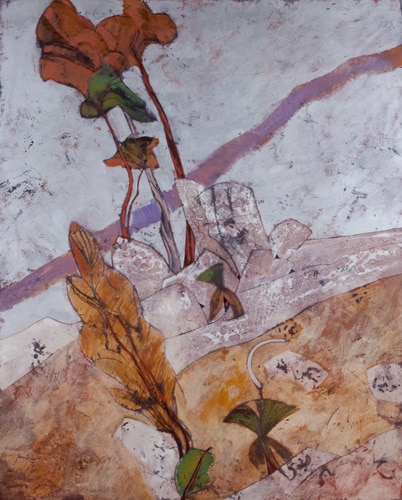
In the early phase of his career, Robert Juniper (and other Western Australian painters) developed in isolation, far away from Melbourne and Sydney, the apparent centres of the Australian art scene. Juniper became thankful for that remoteness as it allowed him to develop at his own pace and free from the effects of the fashion and art movements that were sweeping through those centres.
He did have doubts about being isolated, and they surfaced from time to time but soon passed and he was able to grow as a painter. Juniper also had a teaching career that provided for the family and afforded him the freedom to paint as he wished – “I can think of nothing worse than going into the studio and thinking I’ve got to feed the family.”
In an interview with Laurie Thomas in 1969 Robert Juniper said, “I think it is a painter’s duty if not his goal to be himself – to paint from his own experience, what’s inside him and not from the glossy magazines.” Thomas considered that Juniper had a poetic feeling for the Australian landscape. “I feel that I’m developing what I feel is an indigenous thing – indigenous to Western Australia – because I don’t feel any strong influence from anywhere else,” was another quote from the Thomas interview. Juniper is correct in his assessment, as his work is free from outside influence though others have been influenced by his work.
With this work “John Forrest Rocks”, Juniper has painted a portrait of the landscape not far from his home range of Darlington. He has isolated a group of engaging rocks (that appear in many of his drawings) surrounded by minimal vegetation that may or may not exist. The trees and shrubs form an important part of the composition and are drawn or incised in a manner that is unmistakably his – this is not a literal scene but the essence of a memory – his sense of order and design is impeccable. Silvery tones, slippery surfaces and withdrawn colour indicate winter as the season.
On closer inspection of the picture, the over painting, incised lines and build up of texture come into view. He has worked and scraper and layered different medium in the hunt of the effect he seeks. Juniper uses whatever tools are available in this pursuit – nothing is sacred. In a television film of the 90’s he explained that his children often complained when they found their toothbrushes, combs and hairbrushes in their fathers studio – appropriated in the cause of art – though always quickly replaced.
For over 50 years, Robert Juniper has lived and worked in Darlington, a hills location 20 kilometers east of Perth, surrounded by the trees and landscape he captures on canvas so distinctively.
